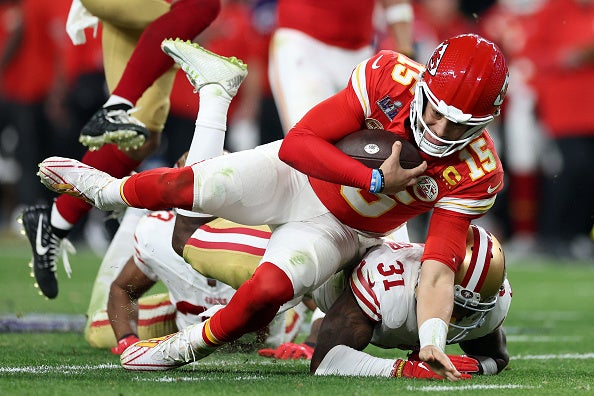More than 100 million people watched the Kansas City Chiefs beat the San Francisco 49ers in the Super Bowl LVIII, one of sport’s annual highlights.
While much of the commentary surrounding the game was the Chiefs’ shot at winning their third Super Bowl in five years, the spotlight once again realigned on the league’s hidden health danger.
Though chronic traumatic encephalopathy (CTE) was first discovered in National Football League (NFL) players over 20 years ago, only recent evidence has started to shed light on the implications the disease has on brain function. This includes behavioural changes, memory loss, and severe dementia.
Due to the amount of former NFL players affected, there is an ongoing controversial “concussion settlement”. The sports league has paid out nearly $1.2bn to more than 1,600 former players and their families, amidst allegations it concealed known information about the detrimental health consequences.
The neurodegenerative disease, caused by frequent sub-concussive impacts on the brain, does not cause any symptoms and so largely goes unnoticed. Full clinical diagnosis of brain tissue degeneration is currently only done after death. It is not just restricted to NFL players, those engaging in any sport involving head contact are at risk.
But researchers are getting closer to diagnosing the disease in living sports players, increasing the chance earlier intervention. A study from Boston University has demonstrated a clear link between the amount of CTE pathology and the severity of functional and cognitive symptoms. Though at a rudimentary level, the results – which were published in Molecular Neurodegeneration – could provide a framework for building objective assessments to help CTE patients obtain a diagnosis outside research settings.
Re:Cognition Health, a brain clinic that advocates for more information being conveyed to contact sports players, has been pushing for early diagnosis in living CTE patients. Using diffusion tensor imaging (DTI) in conjunction with magnetic resonance imaging (MRI) scans, the clinic is helping convey clinical brain information to sports players. Coupled with clinical evaluations and cognitive assessments, Re:Cognition Health has successfully identified a clinical diagnosis of CTE in life in a large number of relatively young contact sports players, according to its CEO and founder Dr Emer MacSweeney.
Dr MacSweeney described the new advancements that could propel CTE diagnosis: “Development of sophisticated biomarkers to identify the abnormal inflammatory markers and toxic tau protein in the brain, associated with CTE will hopefully enable early accurate diagnosis”
“Similarly, functional MRI imaging to interrogate microscopic changes in the brain resulting from the structural damage and cell loss due to CTE, will enable earlier diagnosis and most importantly a diagnosis ‘in life’, when intervention is still possible.”
Students at Loughborough University in the UK have even developed a handheld device that could detect sports-related concussions in under ten seconds by recording changes in a person’s pupils. The University of Birmingham is also developing a saliva test for detecting concussion female athletes.
Dr MacSweeney also pointed to preventative products that are helping the CTE fight. Rezon Halos has designed headwear to minimise forces exerted on the brain during sport. The band has CE marking and is registered as a medical device with the Medicines and Healthcare products Regulatory Agency (MHRA) in the UK. European regulation is important, as CTE has a strong link not just with America-centric NFL but with other contact sports like rugby too.
“To have some chance to find treatments for this condition, at least to try to slow its progression, diagnosis in life is essential,” Dr MacSweeney added.









